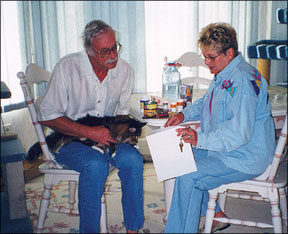You have a wonderful vacation planned, a two-week escapade to a sunny island after a long year of hard work and stress. Youve been looking forward to it for months, but a nagging problem remains: Who should take care of Tabby while youre away? Bev Caldwell 288 What you do with your cat when you take a vacation should depend on your cats personality, health condition, age and the resources available where you live. Hiring a pet sitter, kenneling your cat or boarding him with a veterinarian are options for care when you arent home. Hiring a Sitter Most cats prefer the status quo, so leaving your cat at home where he feels safe and secure under the care of a reliable pet sitter may be the least stressful option for both you and your cat. “Pet sitting can work out very well, especially for fearful cats,” says Joanna Guglielmino, DVM, an associate veterinarian at The Cat Doctor, a Seattle-area clinic specializing in feline health. A pet sitter will not only care for your cat, but can also water your plants, bring in the newspaper and mail, turn lights on and off and generally make your house look lived in while you are away. “Ideally, have someone the cat already knows such as a responsible friend or neighbor care for the cat,” says Drew Weigner, DVM, board-certified by the American Board of Veterinary Practitioners and whose practice is The Cat Doctor in Atlanta, Georgia. If you dont know a reliable person who can care for your cat, you can hire a professional pet sitter. Finding the right sitter requires time and effort locating and interviewing potential candidates, so start well in advance of your trip. You can ask your veterinarian or cat-owning friends for a referral to a bonded and insured sitter. If you cant get a recommendation, look in the Yellow Pages. Call and interview potential candidates on the phone, then interview the sitter at your home. A pet sitter should make an initial visit free of charge to meet you and your cat, and to get the necessary care information. “You want someone who is tuned in to your cat and who will not only feed and water them, but hang out for awhile so they can observe the cat and recognize any possible problems,” says Dr. Guglielmino. Ask the sitter for a list of references. Find out what experience the sitter has with cats. An appropriate pet sitter will be sensitive to a cats needs and health issues. Make certain he or she visually sees the cat on each visit and notes if the cat uses the litter box and what food the cat has consumed. “If a cat doesnt eat for several days, this can become a serious health issue,” says Dr. Guglielmino. Have the sitter visit your cat at least once a day, preferably twice. Often, cat owners assume the cat will do well with a visit only once every two or three days, but infrequent visits can be risky. “Cats are not self-sufficient,” says Dr. Guglielmino. “A lot can happen even in 24 hours. If the cat develops urinary blockage in the morning, for example, he may be in extreme pain by evening.” If you have a skittish kitty, he may hide from a stranger. “Some cats need more interaction,” says Dr. Guglielmino, “and it may take a longer time to build up trust.” Tell the sitter what brands of food your cat eats, how much and how often, and where the food is kept. Leave a list of instructions, and include the phone numbers where you can be reached while youre away, and backup phone numbers of friends and neighbors if she cant reach you (of course, leave the number of your cats veterinarian, as well). Remember, the sitter is not only responsible for your cat but also your house, so make sure she knows whom to contact if any problems arise. “Be sure to quiz the sitter about how she handles medical emergencies,” says Dr. Guglielmino. Let your veterinarian know who the sitter is and that she has the authority to bring your cat for treatment in your absence. Some pet owners leave a letter on file with their veterinarians authorizing the sitter to bring kitty if problems arise and saying that the owner will be responsible for charges. In other cases, the sitter may pay the veterinarians bill and request payment from you later. In all cases, make sure the sitter has a service contract outlining the terms of the service and what is to be done that is signed by both of you. Give the sitter a working key, and make sure she gives you a business card so that you can call while you are away to check on your cat. If you want to test how your cat will do with a sitter and vice versa, schedule an overnight trip and have the sitter come in while you are gone. “Regardless of whom you select, do a double check by having a neighbor stop in periodically,” says Dr. Guglielmino. If your cat requires medication or shots, ask if the sitter is able to administer them. “Its good to know if the sitter can give medications or injections,” says Dr. Weigner. If your cat is acutely ill, reschedule your trip. “If rescheduling is not possible, then its probably best to hospitalize the cat at your veterinarians or be absolutely certain the sitter knows what to look for and wont hesitate to call your veterinarian,” says Dr. Weigner. A pet sitter charges by the visit. Expect to pay $10 to $20 per visit, depending on where you live. Schedule a sitter well in advance. Kenneling Your Cat Some cats, such as the more laid-back personalities, are good candidates for a boarding kennel. “Cats that must go outside or those that hide should probably be kenneled so they can be observed,” says Dr. Weigner. Use the same methods of locating a good one as you would finding a sitter. The preference is to select a cats-only kennel or one that has separate facilities for cats and dogs. “The noise of dogs is very frightening to cats,” says Dr. Guglielmino. Call and ask to visit. Visually inspect the facilities. Assess the kennels cleanliness with your nose and eyes. Assess the condition of the other cats. “You dont want to consider any place with sniffling or sneezing cats,” says Dr. Guglielmino. Make certain that the kennel does not let the cats intermingle because of the spread of infectious disease. “Cats can carry respiratory viruses, and under the stress of being at a boarding facility, they can pick up a new bug,” says Dr. Guglielmino. Look for a cat-savvy kennel owner, one who is pleasant and willing to answer your questions. “They should be able to notice signs of illness that might develop and have a place to isolate ill cats,” says Dr. Guglielmino. Look at individual cages. “They should be a size that allows cat to move around,” says Dr. Guglielmino. “Multilevel cages are really nice.” At Catnip Suites, the facility that is part of The Cat Doctor Veterinary Center in Federal Way, Washington, each cage has the potential for three levels, a ledge to sleep on with a litter pan below and a door to connect to adjacent kennels if they are not in use. Cages should be made of a sturdy surface that allows for proper cleaning, such as some kind of Formica, hard plastic or stainless steel. “In a kennel, the concern is with the spread of infectious diseases,” says Dr. Guglielmino. Cages should be spaced so that the caretaker can clean them with an antiseptic cleaner. “Im hesitant about wood or mesh cages,” says Dr. Guglielmino. When boarding your cat, take your cats own bed for him to sleep in. “Cats really like to be in their own bed as they are going to be somewhat frightened,” says Dr. Guglielmino. And bring your cats food so he doesnt have to make a dietary adjustment. “A cat can get diarrhea or vomit from new food, or he may simply not like it,” says Dr. Guglielmino. Tell the kennel how much to feed your cat and how often. If your cat has a medical condition that needs careful supervision, or if he needs medication and is difficult to pill, dont leave him with a sitter or a kennel. “If necessary, leave him with a veterinarian boarding facility or a trained technician who can oversee the cats condition,” says Dr. Guglielmino. Kennels should ask for proof of vaccinations, so bring your cats health certificates with you. “If its required, the kennel is probably going to be a better one,” says Dr. Weigner. A kennel charges by the day and may cost from $10 for basic services to $40 for more luxury-style facilities. Kennels, too, must be booked well in advance.



